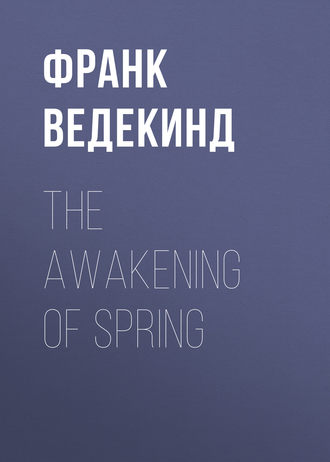 полная версия
полная версияThe Awakening of Spring
That doesn't depend on us, Fanny. That is the risk we took with our happiness. He who is too weak to march stops by the wayside. And, in the end, it is not the worst when what was certain to come comes in time to be bettered. Heaven protect us from that! It is our duty to strengthen the loiterer as long as reason supplies a means.–That they have hunted him out of school is not his own fault. If they hadn't hunted him out of school, that wouldn't have been his fault, either!–You are so lighthearted. You perceive inconsiderable trifles when the question concerns a fundamental injury to character. You women are not accustomed to judge such things. Anyone who can write what Melchior wrote must be rotten to the core of his being. The mark is plain. A half-healthy nature wouldn't do such a thing. None of us are saints. Each of us wanders from the straight path. His writing, on the contrary, tramples on principle. His writing is no evidence of a chance slip in the usual way; it sets forth with dreadful plainness and a frankly definite purpose that natural longing, that propensity for immorality, because it is immorality. His writing manifests that exceptional state of spiritual corruption which we jurists classify under the term “moral imbecility.”–If anything can be done in his case, I am not able to say. If we want to preserve a glimmer of hope, and keep our spotless consciences as the parents of the victim, it is time for us to go to work determinedly in earnest.—Don't let us contend any more, Fanny! I feel how hard it is for you. I know that you idolize him because he expresses so entirely your genial nature. Be stronger than yourself. Show yourself for once devoid of self-interest towards your son.
Frau GaborGod help me, how can one get along that way! One must be a man to be able to talk that way! One must be a man to be able to blind oneself so with the dead letter! One must be a man to be so blind that one can't see what stares him in the eyes. I have conscientiously and thoughtfully managed Melchior from his first day, because I found him impressionable to his surroundings. Are we answerable for what has happened? A tile might fall off the roof upon your head to-morrow, and then comes your friend—your father, and, instead of taking care of you, tramples upon you!–I will not let my child be destroyed before my eyes. That's the reason I'm his mother.–It is inconceivable! It is not to be believed! What did he write, then, after all! Isn't it the most striking proof of his harmlessness, of his stupidity, of his childish obscurity, that he can write so!–One must possess no intuitive knowledge of mankind–one must be an out and out bureaucrat, or weak in intellect, to scent moral corruption here!–Say what you will. If you land Melchior in the House of Correction, I will get a divorce. Then let me see if I can't find help and means somewhere in the world to rescue my child from destruction.
Herr GaborYou must prepare yourself for it–if not to-day, then to-morrow. It is not easy for anyone to discount misfortune. I will stand beside you, and when your courage begins to fail will spare no trouble or effort to relieve your heart. The future seems so gray to me, so full of clouds–it only remains for you to leave me too.
Frau GaborI should never see him again: I should never see him again! He can't bear the vulgar. He will not be able to stand the dirt. He will break under restraint; the most frightful examples will be before his eyes!–And if I see him again–O, God, O, God, that joyous heart–his clear laughter–all, all,–his childish resolution to fight courageously for good and righteousness–oh, this morning sky, how I cherished it light and pure in his soul as my highest good–Hold me to account if the sin cries for expiation! Hold me to account! Do with me what you will! I will bear the guilt.–But keep your frightful hand off the boy.
Herr GaborHe has gone wrong!
Frau GaborHe has not gone wrong!
Herr GaborHe has gone wrong!–I would have given everything to be able to spare your boundless love.–A terrified woman came to me this morning, scarcely able to control her speech, with this letter in her hand–a letter to her fifteen-year-old daughter. She had opened it simply out of curiosity; the girl was not at home.–In the letter Melchior explains to the fifteen-year-old girl that his manner of acting left him no peace, that he had sinned against her, etc., etc., and that naturally he would answer for it. She must not fret herself even if she felt results. He was already on the road after help; his expulsion made it easier for him. The previous false step could still lead to her happiness–and more of such irrational nonsense.
Frau GaborImpossible!
Herr GaborThe letter is forged. It's a cheat. Somebody is trying to take advantage of his generally known expulsion. I have not yet spoken to the lad about it–but please look at this hand! See the writing!
Frau GaborAn unprecedented, shameless bit of knavery!
Herr GaborThat's what I'm afraid!
Frau GaborNo, no–never, never!
Herr GaborIt would be so much the better for us.–The woman, wringing her hands, asked me what she should do. I told her she should not leave her fifteen-year-old daughter lying about a haymow. Fortunately she left me the letter.–If we send Melchior to another grammar school, where he is not under parental supervision, in three weeks we shall have the same result.–A new expulsion–his joyful heart will get used to it after awhile.–Tell me, Fanny, where shall I send the lad?
Frau GaborTo the House of Correction–
Herr GaborTo the?–
Frau GaborHouse of Correction!
Herr GaborHe will find there, in the first place, that which has been wrongfully withheld from him at home, parental discipline, principles, and a moral constraint to which he must submit under all circumstances.–Moreover, the House of Correction is not a place of terror, as you think it. The greatest weight is laid in the establishment upon the development of Christian thought and sensibility. The lad will learn at last to follow good in place of desire and not to follow his natural instincts, but to observe the letter of the law.–A half hour ago I received a telegram from my brother that confirms the woman's statement. Melchior has confided in him and begged him for 200 marks in order to fly to England–
Frau Gabor (Covering her face.)Merciful heavens!
SCENE FOURTH
The House of Correction.—A corridor.—Diethelm, Rheinhold, Ruprecht, Helmuth, Gaston and Melchior DiethelmHere is a twenty pfennig piece!
RheinholdWhat shall we do with it?
DiethelmI will lay it on the floor. Arrange yourselves about it. Who can get it can keep it.
RuprechtWon't you join us, Melchior?
MelchiorNo, thank you.
HelmuthThe Joseph!
GastonHe can't do anything else. He is here for recreation.
Melchior (To himself.)It is not wise for me to separate myself from them. They all have an eye on me. I must join them–or the creature goes to the devil–imprisonment drives it to suicide.–If I break my neck, all is well!–If I escape, that is good, too! I can only win. Ruprecht would become my friend. He has acquaintances here.–I had better give him the chapter of Judas' daughter-in-law, Thamar, of Moab, of Lot and his kindred, of Queen Vashti and of Abishag the Shunammite.–He has the unhappiest physiognomy of the lot of them.
RuprechtI have it!
HelmuthI'll get it yet!
GastonThe day after to-morrow, perhaps.
HelmuthRight away!–Now!–O God! O God!–
AllSumma–Summa cum laude!!
Ruprecht (Taking the money.)Many thanks!
HelmuthHere, you dog!
RuprechtYou swine!
HelmuthGallows bird!
Ruprecht (Hits him in the face.)There! (Runs away.)
Helmuth (Running after him.)I'll strike you dead!
The Rest of Them (Running after.)Chase him! Chase him! Chase him! Chase him!
Melchior (Alone, wandering toward the window.)The lightning rod runs down there.–One would have to wind a pocket handkerchief about it.–When I think of them the blood always rushes to my head. And Moritz turns my feet to lead.–I'll go to a newspaper. If they pay me by space I'll be a free lance!–collect the news of the day–write–locals–ethical–psychophysical–one doesn't starve so easily nowadays. Public soup houses, Café Temperance–The house is sixty feet high and the cornice is crumbling–They hate me–they hate me because I rob them of liberty. Handle myself as I will, there remain misdemeanors–I dare only hope in the course of the year, gradually–It will be new moon in eight days. To-morrow I'll grease the hinges. By Sunday evening I must find out somehow who has the key.–Sunday evening, during prayers, a cataleptic fit–I hope to God nobody else will be sick!–Everything seems as clear to me as if it had happened. Over the window-frames I can reach easily—a swing—a clutch—but one must wind a handkerchief about it.–There comes the head inquisitor. (Exit to the left.)
(Dr. Prokrustes enters from the right with a locksmith.) Dr. ProkrustesThe window is on the third floor and has stinging nettles planted under it, but what do the degenerates care for stinging nettles!–Last winter one of them got out of the trap door on the roof, and we had the whole trouble of capturing him, bringing him back, and locking him up again–
The LocksmithDo you want the grating of wrought iron?
Dr. ProkrustesOf wrought iron–riveted so they cannot meddle with it.
SCENE FIFTH
A bedchamber.—Frau Bergmann, Ina Müller and Doctor von Brausepulver. Wendla, in bed Dr. von BrausepulverHow old are you, exactly?
WendlaFourteen and a half.
Dr. von BrausepulverI have been ordering Blaud's pills for fifteen years and have noticed astonishing results in the majority of cases. I prefer them to cod liver oil and wine of iron. Begin with three or four pills a day, and increase the number just as soon as you are able. I ordered Fräulein Elfriede, Baroness von Witzleben to increase the number of them by one, every third day. The Baroness misunderstood me and increased the number every day by three. Scarcely three weeks later the Baroness was able to go to Pyrmont with her mother to complete her cure.–I will allow you to dispense with exhausting walks and extra meals; therefore, promise me, dear child, to take frequent exercise and to avoid unwholesome food as soon as the desire for it appears again. Then this palpitation of the heart will soon cease–and the headache, the chills, the giddiness–and this frightful indigestion. Fräulein Elfriede, Baroness von Witzleben, ate a whole roast chicken with new potatoes for her breakfast eight days after her convalescence.
Frau BergmannMay I offer you a glass of wine, Doctor?
Dr. von BrausepulverI thank you, dear Frau Bergmann, my carriage is waiting.–Do not take it so to heart. In a few weeks our dear little patient will be again as fresh and bright as a gazelle. Be of good cheer.–Good-day, Frau Bergmann, good-day, dear child, good-day, ladies–good-day.
(Frau Bergmann accompanies him to the door.) Ina (At the window.)Now your plantains are in bloom again.–Can you see that from your bed?–A short display, hardly worth rejoicing over them, they come and go so quickly. I, too, must go right away now. Müller is waiting for me in front of the post-office, and I must go first to the dressmaker's. Mucki is to have his first trousers and Karl is to have new knit leggings for winter.
WendlaSometimes I feel so happy–all joy and sunshine. I had not guessed that it could go so well in one's heart! I want to go out, to go over the meadows in the twilight, to look for primroses along the river and to sit down on the banks and dream—Then comes the toothache, and I feel as if I had to die the next morning at daybreak; I grow hot and cold, it becomes dark before my eyes; and then the beast flutters inside.–As often as I wake up, I see Mother crying. Oh, that hurts me so.–I can't tell you how much, Ina!
InaShall I lift your pillows higher?
Frau Bergmann (Returning.)He thinks the vomiting will soon cease; and then you can get up in peace–I, too, think it would be better if you got up soon, Wendla.
InaPossibly when I visit you the next time you will be dancing around the house again. Good-bye, Mother. I must positively go to the dressmaker's. God guard you, Wendla dear. (Kisses her.) A speedy, speedy recovery! (Exit Ina.)
WendlaWhat did he tell you, Mother, when he was outside?
Frau BergmannHe didn't say anything.–He said Fraülein von Witzleben was subject to fainting spells also. It is almost always so with chlorosis.
WendlaDid he say that I have chlorosis, Mother?
Frau BergmannYou are to drink milk and eat meat and vegetables when your appetite comes back.
WendlaO, Mother, Mother, I believe I haven't chlorosis–
Frau BergmannYou have chlorosis, child. Be calm, Wendla, be calm, you have chlorosis.
WendlaNo, Mother, no! I know it. I feel it. I haven't chlorosis. I have dropsy–
Frau BergmannYou have chlorosis. He said positively that you have chlorosis. Calm yourself, girl. You will get better.
WendlaI won't get better. I have the dropsy, I must die, Mother.–O, Mother, I must die!
Frau BergmannYou must not die, child! You must not die—Great heavens, you must not die!
WendlaBut why do you weep so frightfully, then?
Frau BergmannYou must not die, child! You haven't the dropsy, you have a child, girl! You have a child!–Oh, why did you do that to me!
WendlaI haven't done anything to you.
Frau BergmannOh don't deny it any more, Wendla!–I know everything. See, I didn't want to say a word to you.–Wendla, my Wendla–!
WendlaBut it's not possible, Mother. I'm not married yet!
Frau BergmannGreat Almighty God–that's just it, that you are not married! That is the most frightful thing of all!–Wendla, Wendla, Wendla, what have you done!!
WendlaGod knows, I don't know any more! We lay in the hay–I have loved nobody in the world as I do you, Mother.
Frau BergmannMy sweetheart–
WendlaO Mother, why didn't you tell me everything!
Frau BergmannChild, child, let us not make each other's hearts any heavier! Take hold of yourself! Don't make me desperate, child. To tell that to a fourteen-year-old girl! See, I expected that about as much as I did the sun going out. I haven't acted any differently towards you than my dear, good mother did toward me.–Oh, let us trust in the dear God, Wendla; let us hope for compassion, and have compassion toward ourselves! See, nothing has happened yet, child. And if we are not cowardly now, God won't forsake us.–Be cheerful, Wendla, be cheerful!–One sits so at the window with one's hands in one's lap, while everything changes to good, and then one realizes that one almost wanted to break one's heart–Wa–why are you shivering?
WendlaSomebody knocked.
Frau BergmannI didn't hear anything, dear heart. (Goes and opens the door.)
WendlaBut I heard it very plainly–Who is outside?
Frau BergmannNobody–Schmidt's Mother from Garden street.–You come just at the right time, Mother Schmidt.
SCENE SIXTH
Men and women wine-dressers in the vineyard. The sun is setting behind the peaks of the mountains in the west. A clear sound of bells rises from the valley below. Hans Rilow and Ernest Röbel roll about in the dry grass of the highest plot under the overhanging rocks.
ErnestI have overworked myself.
HansDon't let us be sad!–It's a pity the minutes are passing.
ErnestOne sees them hanging and can't manage any more–and to-morrow they are in the wine press.
HansFatigue is as intolerable to me as hunger.
ErnestOh, I can't eat any more.
HansJust this shining muscatelle!
ErnestMy elasticity has its limit.
HansIf I bend down the vine, we can sway it from mouth to mouth. Neither of us will have to disturb himself. We can bite off the grapes and let the branches fly back to the trunk.
ErnestOne hardly decides upon a thing, when, see, that vanishing power begins to darken.
HansHence the flaming firmament–and the evening bells–I promise myself little more for the future.
ErnestSometimes I see myself already as a worthy pastor—with a good-natured little wife, a well-filled library and offices and dignities all about me. For six days one has to think, and on the seventh one opens one's mouth. When out walking, one gives one's hand to the school-girls and boys, and when one comes home the coffee steams, the cookies are brought out and the maids fetch apples through the garden door.–Can you imagine anything more beautiful?
HansI imagine half-closed eyelids, half-open lips and Turkish draperies.–I do not believe in pathos. Our elders show us long faces in order to hide their stupidity. Among themselves they call each other donkeys just as we do. I know that.–When I am a millionaire I'll erect a monument to God.–Imagine the future as a milkshake with sugar and cinnamon. One fellow upsets it and howls, another stirs it all together and sweats. Why not skim off the cream?–Or don't you believe that one can learn how?
ErnestLet us skim!
HansWhat remains the hens will eat.–I have pulled my head out of so many traps already–
ErnestLet us skim, Hans!–Why do you laugh?
HansAre you beginning again already?
ErnestBut one of us must begin.
HansThirty years from now, on some evening like to-day, if we recall this one, perhaps it will seem too beautiful for expression.
ErnestAnd how everything springs from self!
HansWhy not?
ErnestIf by chance one were alone–one might like to weep!
HansDon't let us be sad! (He kisses him on the mouth.)
Ernest (Returning the kiss.)I left the house with the idea of just speaking to you and turning back again.
HansI waited for you.–Virtue is not a bad garment, but it requires an imposing figure.
ErnestIt fits us loosely as yet.–I should not have been content if I had not met you.–I love you, Hans, as I have never loved a soul–
HansLet us not be sad.–If we recall this in thirty years, perhaps we shall make fun of it.–And yet everything is so beautiful. The mountains glow; the grapes hang before our mouths and the evening breeze caresses the rocks like a playful flatterer.–
SCENE SEVENTH
A clear November night. The dry foliage of the bushes and trees rustles. Torn clouds chase each other beneath the moon–Melchior clambers over the churchyard wall.
Melchior (Springing down inside.)The pack won't follow me here.–While they are searching the brothels I can get my breath and discover how much I have accomplished.
Coat in tatters, pockets empty–I'm not safe from the most harmless.–I must try to get deeper into the wood to-morrow.
I have trampled down a cross–Even to-day the flowers are frozen!–The earth is cold all around–
In the domain of the dead!–
To climb out of the hole in the roof was not as hard as this road!–It was only there that I kept my presence of mind–
I hung over the abyss–everything was lost in it, vanished–Oh, if I could have stayed there.
Why she, on my account!–Why not the guilty!–Inscrutable providence!–I would have broken stones and gone hungry!–What is to keep me straight now?–Offense follows offense. I am swallowed up in the morass. I haven't strength left to get out of it–
I was not bad!–I was not bad!–I was not bad!–No mortal ever wandered so dejectedly over graves before.–Pah!–I won't lose courage! Oh, if I should go crazy–during this very night!
I must seek there among the latest ones!–The wind pipes on every stone in a different key–an anguishing symphony!–The decayed wreaths rip apart and swing with their long threads in bits about the marble crosses–A wood of scarecrows!–Scarecrows on every grave, each more gruesome than the other–as high as houses, from which the devil runs away.–The golden letters sparkle so coldly–The weeping willows groan and move their giant fingers over the inscriptions–
A praying angel–a tablet.
The clouds throw their shadows over it.–How the wind hurries and howls!–Like the march of an army it drives in from the east.–Not a star in the heavens–
Evergreen in the garden plot?–Evergreen?–A maiden–
HERE RESTS IN GOD
Wendla Bergmann, born May 5, 1878, died from Cholorosis, October 27, 1892 Blessed are the Pure of HeartAnd I am her murderer. I am her murderer!–Despair is left me–I dare not weep here. Away from here!–Away–
Moritz Stiefel (With his head under his arm, comes stamping over the graves.)A moment, Melchior! The opportunity will not occur so readily again. You can't guess what depends upon the place and the time–
MelchiorWhere do you come from?
MoritzFrom over there–over by the wall. You knocked down my cross. I lie by the wall.–Give me your hand, Melchior.–
MelchiorYou are not Moritz Stiefel!
MoritzGive me your hand. I am convinced you will thank me. It won't be so easy again! This is an unusually fortunate encounter.–I came out especially–
MelchiorDon't you sleep?
MoritzNot what you call sleep.–We sit on the church-tower, on the high gables of the roof–wherever we please.–
MelchiorRestless?
MoritzHalf happy.–We wander among the Mayflowers, among the lonely paths in the woods. We hover over gatherings of people, over the scene of accidents, gardens, festivals.–We cower in the chimneys of dwelling-places and behind the bed curtains.–Give me your hand.–We don't associate with each other, but we see and hear everything that is going on in the world. We know that everything is stupidity, everything that men do and contend for, and we laugh at it.
MelchiorWhat good does that do?
MoritzWhat good does it have to do?–We are fit for nothing more, neither good nor evil. We stand high, high above earthly beings—each for himself alone. We do not associate with each other, because it would bore us. Not one of us cares for anything which he might lose. We are indifferent both to sorrow and to joy. We are satisfied with ourselves and that is all. We despise the living so heartily that we can hardly pity them. They amuse us with their doings, because, being alive, they are not worthy of compassion. We laugh at their tragedies—each by himself–and make reflections upon them.–Give me your hand! If you give me your hand, you will fall down with laughter over the sensation which made you give me your hand.
MelchiorDoesn't that disgust you?
MoritzWe are too high for that. We smile!–At my burial I was among the mourners. I had a right good time. That is sublimity, Melchior! I howled louder than any and slunk over to the wall to hold my belly from shaking with laughter. Our unapproachable sublimity is the only viewpoint which the trash understands–They would have laughed at me also before I swung myself off.
MelchiorI have no desire to laugh at myself.
MoritzThe living, as such, are not really worth compassion!–I admit I should not have thought so either. And now it is incomprehensible to me how one can be so naïve. I see through the fraud so clearly that not a cloud remains.–Why do you want to loiter now, Melchior! Give me your hand! In the turn of a head you will stand heaven high above yourself.–Your life is a sin of omission–
MelchiorCan you forget?
MoritzWe can do everything. Give me your hand! We can pity the young, who take their timidity for idealism, and the old, who break their hearts from stoical deliberation. We see the Kaiser tremble at a scurrilous ballad and the lazzaroni before the youngest policeman. We ignore the masks of comedians and see the poet in the shadow of the mask. We see happiness in beggars' rags and the capitalist in misery and toil. We observe lovers and see them blush before each other, foreseeing that they are deceived deceivers. We see parents bringing children into the world that they may be able to say to them: “How happy you are to have such parents!”–and see the children go and do likewise. We can observe the innocent girl in the qualms of her first love, and the five-groschen harlot reading Schiller.–We see God and the devil blaming each other, and cherish the unspeakable belief that both of them are drunk–Peace and joy, Melchior! You only need to reach me your little finger. You may become snow-white before you have such a favorable opportunity again!
MelchiorIf I gave you my hand, Moritz, it would be from self-contempt.–I see myself outlawed. What lent me courage lies in the grave. I can no longer consider noble emotions as worthy.–And see nothing, nothing, that can save me now from my degradation.–To myself I am the most contemptible creature in the universe.





